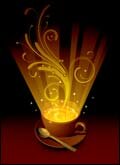Caffeine in Coffee vs Tea
The Definitive Guide

(And we're talking about the caffeinated versions of each of these beverages - not the decaffeinated varieties!)
It cannot be denied that prepared coffee has more caffeine per cup than brewed black tea, green tea, or any other tea made from the leaves of the Camellia sinensis plant.
However, and this is where things get strange, research has also shown that weight-for-weight dried coffee (beans or granules) has less caffeine content than un-brewed tea leaves!
So how does this affect you, the avid tea drinker? Well, if you know how much caffeine there is in your tea (or coffee for that matter), then you can make an informed decision about how much you should ideally drink per day.
- On an average it's safe to say that there is at least 90mg of caffeine in an 8oz. cup of brewed coffee vs. about 65mg in an 8oz. cup of brewed black tea (bag or leaf). This is an average figure - not an exact one.
- The amount of caffeine to be found in your tea depends on how long you brew the tea for. That's right - the longer you brew your tea, the more caffeine content to be found in your cup.
- That said, if you use your tea leaves for steeping more than once, the caffeine content in them falls. The most amount of caffeine to be found always comes from that very first steeping - so for the second, third and even fourth brewing the caffeine content is less.
- Caffeine content in a cup of tea cannot be determined by the color of the tea. Just because a tea is darker colored does not mean that it has more caffeine. (Some lighter green teas have more caffeine in them than their darker counterparts.)
- More variables come into this mix however, when you consider that the amount of caffeine to be found in a normal serving of coffee also changes along with a number of things, such as how strong you make your coffee, the way you make your coffee, and also, interestingly enough, what type of blend you're using.
- Since roasting the coffee beans affects the caffeine content, dark roasted coffees (roasted for longer) have less caffeine than lighter roasted varieties.
- And for instance, Arabica coffees have less caffeine in them than Robusta coffee varieties.
- Obviously, if you're going to add more coffee to your cup of coffee, you're also going to get more caffeine in your coffee, so that also affects caffeine intake.
- And let's also not forget that the length of time you brew your coffee also has an effect on the caffeine content in your cup of coffee. The longer you brew, the more caffeine you will get.
- Interestingly enough, drip coffee has less caffeine than brewed coffee does.
- So what about instant coffees then? If you're a coffee fan you're definitely not going to have time to brew or drip a fresh cup every single time. You might hate it, but there will be times when you need to dash off a cup of instant coffee instead. So where does that leave you on the caffeine scale?
- Instant coffee has at least 65mg of caffeine per 8oz. serving. (This will obviously go higher if you add more coffee granules to your cup.)
To help you put things in perspective, take a look at the table below.
- 8oz. serving
- Caffeine (mg)
- Coffee, brewed
- 80-135
- Coffee, drip
- 115-175
- Coffee, instant
- 65-100
- Coffee, decaffeinated
- 5-15
- Espresso
(2 oz. serving size) - 100
- Tea, Black
(tea bag or loose leaf) - 50-65
- Tea, Green
- 15-35
- Tea, White
- 10-25
- Tea, Oolong
- 15-50
Disclaimer: The information contained on this site is not intended to replace the diagnosis, treatment, consultation and services of a qualified Medical Practitioner. All information presented is in summary form and intended only for informational purposes. Always seek immediate medical attention for any illness you may have and never disregard the advice from qualified Medical Practitioners as something you have read on this site (or related sites) could be misinterpreted.

